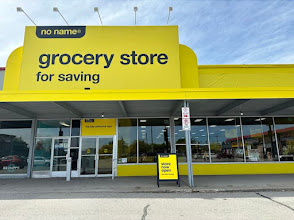Cananda: Loblaw’s No Frills discount stores show focus on cash-strapped Canadians
- DRC Discount Retail Consulting GmbH

- Jul 26, 2025
- 3 min read
Discount Retail Chain No Name, launched by Loblaw, are stores which are less complicated to run because they will rely on reused fixtures such as shelves and cash lanes to reduce costs, while also having:
Shorter operating hours (10am-7pm)
Smaller assortment means the store is less complicated to run
Limited marketing and no flyers
No refrigeration (no dairy or fresh meat products)
Reused fixtures – shelves, cash lanes – to minimize building costs
Fewer weekly deliveries, reducing logistic costs
“Running a traditional grocery store can be expensive, but by reducing our building and operating costs, as well as the overall complexity of the store, we do believe that we can deliver meaningful savings,” Per Bank, Loblaw CEO and president, told The Canadian Press.
Prices will be up to 20% cheaper than comparable items at nearby discount stores, with about two-thirds being below $5. Just under 60 per cent will be No Name or President’s Choice private label brands.
Retail analyst Bruce Winder said reusing fixtures and changing hours could lead to better costs for consumers.
“They’ve sort of taken every nickel and dime out of the cost of the operation, which allows them to sell cheaper every day and still make money,” he told Global News.
No name's goal is simple
Providing food and essential household items across a limited range of national brands and no name brand products at our lowest possible price,” said Per Bank, President and CEO, Loblaw. “Since food inflation took off globally, we have been laser-focused on doing what we can to keep prices lower for customers, including opening more discount food locations in more parts of the country. This new test concept allows us to pass on lower prices to our customers, it’s a completely different and simplified shopping experience.”
Get daily National news
Get the day's top news, political, economic, and current affairs headlines, delivered to your inbox once a day.
It’s not just store size, however, that will be different, inventory will be too. There will be less variety of items with about 1,300 individual products, compared with 7,000 at the smaller-format No Frills locations. Those items will include frozen food, packaged bakery products, produce and pantry staples, but no refrigerated foods like dairy or fresh meat.
Winder said he believes the company has gone with an “80-20” model, in which it may have chosen the 20 % of items that bring in about 80 % of revenues to fill these No Name locations.
“What they’ve done is they’ve cherry-picked the highest movers, the highest consumables,” Winder said.
While it may lead to cuts in overhead costs, Michael Mulvey, associate professor of marketing at the University of Ottawa, told Global News it’s difficult to determine how consumer-friendly it will be.
“Part of the value of going to a grocery store is to be able to get all your groceries, to put together a meal before you get your kid off to soccer practice,” Mulvey said. “By this model, it looks like you can get a few staples that are dry goods, not refrigerated, but it means you’re going to have to go somewhere else.”
Lack of choice could pose issues
Mulvey said it’s difficult to say how successful the stores will be, in part because Canadian consumers prefer choice.
“If you look in people’s grocery cart, some of them are going to be generic products,” he said. “But I also notice that there’s a lot of people that will get like one-quarter of the volume of ice cream for three times the price. Why? Because they like premium goods.”
Bank said within six months he expects the company will have an idea of if the concept is working, but if it isn’t, they take what they’ve learned and apply it elsewhere.
However, Winder thinks it could work because of the cost-of-living struggles many Canadians are facing.
Food Banks Canada reported on Thursday new polling data of 1,500 adults from July that found 35% of Canadians feel financially worse off compared with just three months ago, with 47% of those with incomes below $50,000 facing what it called serious financial hardship.
Though Canadians like choice, Winder said Loblaw’s pilot No Name stores and its previously announced No Frills discount locations could be targeted at these Canadians.
“I think the people who are living at the margin they’re targeting probably are used to sort of store hopping to get what they need,” Winder said.
Store tests since September 2024
The no name store is piloting in three markets in Ontario at Windsor, St. Catharines, and Brockville.





This StoreOpinion.Ca Canadian Superstore Survey is organised by Loblaws store to collect insights, opinions, reactions, preferences, and complaints from customers to improve their product quality, service, store quality, ambiance, employees & customer satisfaction.